
The new Darren Aronofsky movie mother! begins with a deceptively simple premise: we are introduced to a young woman (Jennifer Lawrence) as she wakes one morning in an secluded country house and looks around for her husband (Javier Bardem). We learn that she spends most of her time cleaning and restoring their home, which recently was subject to a devastating fire, and he spends his days searching for inspiration in an effort to follow up his wildly successful book of poetry. Their seemingly peaceful existence is breached when a man (Ed Harris) who claims to be a fan of the poet and his wife (Michelle Pfeiffer) show up on their doorstep unannounced and request to stay the night.
From there, it’s safe to say that things spin wildly out of control and with masterworks like Requiem for a Dream and Black Swan under his belt, there’s no storyteller that I trust more with a tale about a descent into madness than Aronofsky. The breakthrough with this film and what makes it stand out among the other titles in his filmography is how small the scope of the story is towards the beginning and just how much it encompasses by its conclusion. The film’s sole location, the couple’s home, cleverly follows this concept too, as we’re able to get our bearings on the size of each major room early on but with each escalation in the story, the house seems to expand in impossible proportions.
This is also fitting for a film that applies nightmare logic to near-perfect effect as it lulls us into a sense of security with establishing shots that feel like a dream and then slowly shifts the paradigm of reason to places that are unrecognizable and terrifying. Comparisons to Polanski (Repulsion in particular) are certainly apt in terms of mood while there seems to be echoes of Buñuelian absurdism (The Exterminating Angel especially) as the plot develops but the horror that it generates is unquestionably unique. It’s uncanny just how much tension Aronofsky and his cinematographer Matthew Libatique are able to establish by utilizing just three basic camera angles — close-up, point-of-view and over-the-shoulder — that all center around the central character.
It’s been dispiriting to watch a great young actress like Jennifer Lawrence commit herself to blockbuster franchises like The Hunger Games and the X-Men series over the past five years but I suppose it makes watching a great performance like the one she gives here even more satisfying. Her role is more reactive than we’re used to seeing from her in films like Winter’s Bone and American Hustle, so much so that some may even feel she’s miscast here, but the level of unease and discomfort that she’s able to convey lends yet another dimension to her acting chops. The interaction that she has with Harris and especially Pfeiffer is often loaded with buried emotion, from disgust to jealousy to rage, that manages to find its way to the surface in unexpected ways.
With loads of Biblical allusions and its commentary on humanity and our place in the universe, Aronofsky has crafted a bombastic and challenging work that has already inspired feverish analysis and debate and will no doubt continue to do so in the future. As this is a puzzle movie of sorts, I always come back to the same central question I ask myself when viewing others like it: even if I don’t have every aspect of the picture figured out, did what I see resonate enough with me that I’d find it worthwhile to dig deeper? Immediately after I saw mother!, I knew the answer was “yes” but the staying power that it’s had with me in the days following are an even better indication of its artistic merit.








